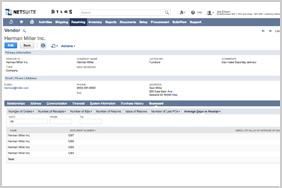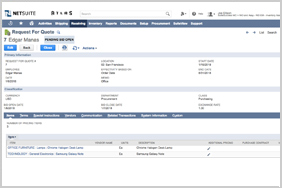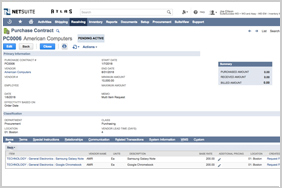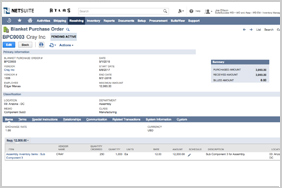Source
Manage your vendors, process RFQs, establish contracts and enforce procurement policies.
NetSuite’s manufacturing functionality can be configured in three different ways, depending on how much control and influence is required in the production process. The work order is typically the main control document for manufacturers, but NetSuite also offers the ability to work in an environment without work orders, which is often advantageous for those following lean principals. NetSuite’s advanced manufacturing module offers the ability to manufacture in batches with automatic batch creation, full traceability, production control and scheduling
Features
Vendor Management
CRM was one of the pillars that NetSuite was built on and those key features also apply to the ability to manage vendor relations. Vendors can be easily onboarded and then audited on a regular basis using workflows. Every transaction is tracked, analyzed and then included in the vendor scorecard, letting users easily keep track of vendor performance. The vendor portal is an additional free feature that allows users to quickly and easily collaborate on current and future projects.
Key Capabilities:
- Centralized vendor management
- Free collaboration portals
- Vendor scorecard

Request For Quote
Gathering quotes for new items or updating pricing on existing quotes can be time consuming and complicated. NetSuite’s RFQ feature allows users to easily manage everything from one screen. This includes: gathering requirements, selecting vendors, communicating specifications, receiving bids and updating pricing. Once the vendor is selected, all information is automatically updated in the vendor and item records. Users can also create purchasing contracts and workflows can be utilized where approvals are required.
Key Capabilities:
- Track multiple vendors
- Flexible pricing scenarios
- Track terms and conditions

Purchase Contracts
Establishing commercial terms and ensuring compliance is a critical part of maintaining a business’s cost control. NetSuite allows users to do this using our purchasing contracts feature. Contracts can be established manually or automatically from the RFQ process and can also be created for future dates with automatic activation. Minimum and maximum spend can be defined, and NetSuite also keeps track of the total amounts purchased, billed and received.
Key Capabilities:
- Ensure commercial compliance
- Updated automatically from transactions
- Automatically created from RFQ’s

Blanket PO’s
While purchasing contracts manage the commercial nature of vendor relationships, blanket POs allow users to establish and track specific delivery schedules. When used in conjunction with purchasing contracts, blanket POs allow complete control over when to receive products and how much the business as agreed to pay for them.
Key Capabilities:
- Enter and track delivery schedules
- Updated automatically from transactions
- Reduced workload for your buyers





























